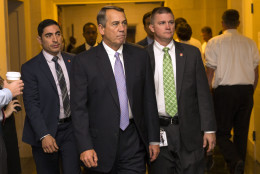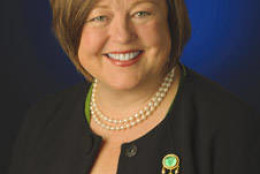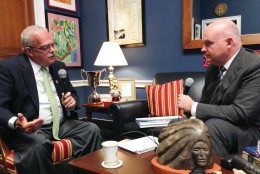Congress
-
When Congress comes back next week, it begins a run of five consecutive weeks of work. In congressional time, that's a long stretch of uninterrupted work. A lot can happen if the outgoing Speaker of the House doesn't wait around like I did.
October 12, 2015 -
The House of Representatives will choose a new leader soon and one of the candidates has told members of a federal union he thinks they're hard working they deserve raises and it's time to stop demonizing them. He's one of the Republican candidates for Speaker. Rep. Jason Chaffetz (R-Utah), chairman of the House Oversight and Government Reform Committee announced his candidacy for Speaker on TV yesterday. David Hawkings, senior editor of CQ Roll Call, told In Depth with Francis Rose he's watching how the Speaker's race is unfolding and how it might affect the executive branch.
October 05, 2015 -
Congress passed a 10-week temporary funding bill on Wednesday to keep open the government. The House voted 277-151 on the measure. It now heads to the White House for the president's signature.
September 30, 2015 -
The Office of Personnel Management released updated furlough guidance. The update includes 15 new additions and revisions for agencies and federal employees and what to do in case of a government shutdown.
September 30, 2015 -
It turns out that not having a shutdown, which some said was an indicator of the end of democracy, is worse than having one. At least for some people.
September 29, 2015 -
The resignation of Speaker of the House John Boehner (R-Ohio) is either the solution to avoiding a government shutdown or a disaster in the making that will cause another shutdown or maybe both. David Hawkings, senior editor of CQ Roll Call, is watching the fallout from Boehner's announcement and tells In Depth with Francis Rose what he's seeing.
September 28, 2015 -
Republican leadership in both chambers of Congress thinks it has a plan to get the government funded by Sept. 30 and avoid a shutdown. Jeri Buchholz is strategic business development adviser for FMP Consulting and she explains to In Depth with Francis Rose how preparing for the worst while hoping for the best is valuable advice.
September 25, 2015 -
As the deadline to pass a federal budget nears, agencies are starting to send out instructions to employees on what to do in case of a government shutdown.
September 25, 2015 -
Folks who retired back in the day recall a golden era: A period when they got two cost of living adjustments per year and often got inflation catch-ups that were in the double digits.
September 24, 2015 -
Women of Washington hosts Aileen Black and Gigi Schumm talk to Amie Hoeber, a congressional candidate for Maryland’s 6th Congressional District and former deputy assistant secretary for Army research and development.
September 23, 2015 -
AFGE reminds Congress, White House and others of the concerns feds had during the last government shutdown and the impact the work stoppage had on them and their families in 2013.
September 18, 2015 -
Midnight tonight marks the exact middle of the month of September. That means exactly 15 calendar days until the end of the fiscal year. There is still no clear exit strategy in place to get the government funded for Fiscal 2016. So the possibility of a shutdown exists even though Republican leaders in both chambers say there will be no shutdown. Rep. Gerry Connolly (D-Va.), ranking member of the House Oversight and Government Reform subcommittee on Government Operations, joined In Depth with Francis Rose on Tuesday's Congressional Spotlight. He said he thinks nobody knows exactly how the budget situation will play out.
September 15, 2015 -
Tomorrow at midnight the month of September will be half over. That means only 15 calendar days until government funding runs out. David Hawkings, the senior editor of CQ Roll Call, is watching how Congress is getting closer to doing a deal and getting farther away at the same time. He shared his insight on In Depth with Francis Rose.
September 14, 2015 -
The Prevent a Government Shutdown Act of 2015 demands a bipartisan deal, or an automatic lift of caps for defense and non-defense discretionary spending.
September 11, 2015 -
Congress has its eye on the G-Fund again. Some members want to change the way the rate of return is figured. One version of the federal budget in the House estimates savings up to $32 billion to fund other programs. But, members of the Employee Thrift Advisory Council are warning those changes could cause people to get out of the TSP altogether. Jessica Klement, legislative director of the National Active and Retired Federal Employees Association, joined In Depth with Francis Rose to talk about the proposed legislation.
September 11, 2015







